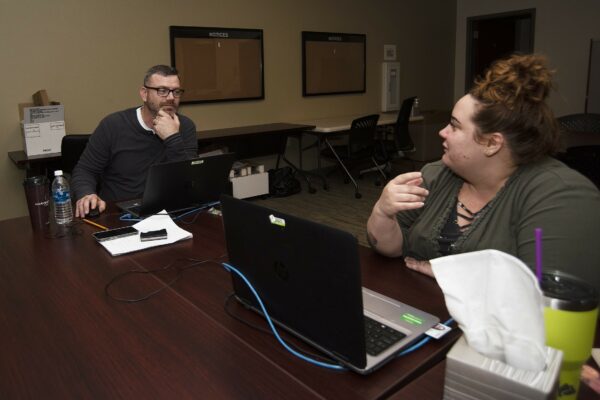Brian Hill | Fort Leonard Wood Public Affairs Office | March 16, 2023
FORT LEONARD WOOD, Mo. — Every day, Fort Leonard Wood Soldiers and civilians help accomplish the mission of turning America’s sons and daughters into Soldiers. As doors open to a seemingly endless number of opportunities for the Army’s newest, another population of Soldiers are completing their time in service and looking to return to civilian life.
That transition — like change, in general — can be scary for some, but the Army has a program in place to help those Soldiers develop new skills and potentially find employment after their military service is up.
The Army’s Career Skills Program, or CSP, provides transitioning Soldiers the opportunity to participate in employment-skills training, on-the-job training, pre-apprenticeships and internships with a high probability of employment in high-demand and highly-skilled jobs — all while the service member retains their pay and allowances, said Transition Services Manager Walt Harris, with Fort Leonard Wood’s Transition Assistance Program.
“They can intern with industry across the United States to help them find employment and be able to provide for their families after transitioning from the Army,” Harris said, adding the hire rate for service members here who complete the CSP currently sits at 85 percent. “They can’t receive any compensation from the organization (while enrolled in the CSP), but they continue to keep their Army benefits — the only thing we ask industry to do is to teach them a skill.”
Soldiers can begin the CSP 180 days prior to their transition date, called the expiration-term of service, or ETS. The program currently has 234 established internship opportunities — employers across a multitude of careers and skill sets — but Harris said they also welcome individual internship ideas from service members.
“A service member can identify an organization — no matter where it is — as long as someone from (that organization’s human resources department) is willing to sponsor them as an intern, they can intern with that organization,” Harris said.
If a Soldier does not find any programs that suit their needs in the CSP — and they don’t want to set up their own internship — Harris said the Department of Defense also offers a similar program called SkillBridge that Fort Leonard Wood’s TAP experts can assist with as well.
“If you can’t find the right fit with CSP, the DOD’s version has even more opportunities available,” Harris said. “There’s something for every skill set.”
Harris said the TAP team also partners with workforce development experts from the state of Missouri, to help individuals find employment — Heroes Connect has a database of more than 13,000 veteran-friendly, Missouri-based employers looking to hire transitioning service members.
“So, if service members want to stay in the state of Missouri, the resources are available for them,” Harris said.
An uncertainty transitioning Soldiers often face is financial, but Army Emergency Relief regularly partners with TAP to help in the form of grants. Pattie McDonald, a Fort Leonard Wood AER specialist, said Army personnel who enroll in CSP can receive $500 for completing a CSP internship within 50 miles of Fort Leonard Wood, and $1,000 for completing an internship more than 50 miles from the installation.
Learn more about AER transition assistance through its Career Skills Support Program.
One of the Soldiers currently enrolled in the CSP here is Sgt. 1st Class Curt Johnson, who is scheduled to retire from the Army at the end of May. Johnson — who originally trained here as an Army engineer, and most recently worked as a small group leader at the Maneuver Support Center of Excellence NCO Academy — is an intern with Mission and Installation Contracting Command-Fort Leonard Wood, which provides contracting solutions for the installation. He said he chose contracting because of the focus in that field on continuing education.
Johnson said one of his goals is to be hired as a DOD civilian when his time in service is up, adding a strength of the CSP is being able to more slowly acclimatize to a different type of workforce.
“The environment, the climate, culture, it’s all different,” Johnson said. “There’s just a different structure and way of doing things. Being able to get in here early and start learning the mannerisms, the vocabulary, has been helpful.”
The goal-oriented nature of service members helps make them ideal candidates for civilian work, Johnson said.
“Progressing toward a better end state — that’s your military mindset,” he added. “If a corporation is looking for an individual to progress a company, an organization, a task, a goal — these are very goal-orientated people, who can achieve said task and won’t hesitate to reach out and find the best possible way to do it.”
One of Johnson’s colleagues at the MICC-Fort Leonard Wood, Rick Switzer, said Johnson, “epitomizes the can-do attitude that all senior NCOs should have.”
“While (Johnson) has never worked in the contracting field, he has taken on the task and excelled,” Switzer said. “He has helped the organization in many ways, bringing knowledge and thinking outside the box.”
Johnson advised future transitioning service members to do a little research on what is available out there, and the TAP specialists here “will help you every step of the way.”
“Don’t be afraid to get out of your comfort zone,” he added. “It’s probably your greatest weakness because you don’t know how far you can excel outside of it if you never step out.”
For more information on the CSP, or any other programs available to transitioning service members at Fort Leonard Wood, call 573.596.0719.

